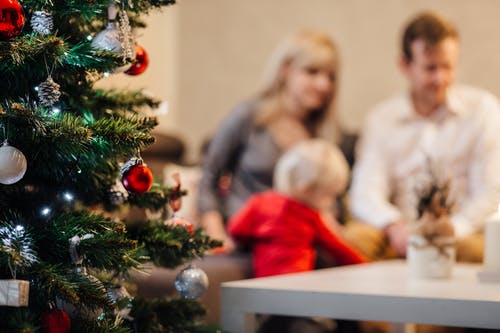The loss of a loved one is felt throughout the year, but grief can hit the hardest during major holidays. In a time when family and friends usually share their happiest memories, an absence can feel overwhelming. You may not even want to participate in the holiday or event, and that’s ok. Everyone grieves differently, but recovery stems from the same ideas. Even during the holidays, multiple steps can be taken to lessen painful feelings while still paying respect to those that have passed.
I was young when my grandfather died- around 7 or 8-years-old. My memories of that time are blurred, but one thing that clearly stands out is my first Christmas Eve without him. I can still recall the bleak atmosphere of my grandmother’s house. Even though many of our family members were assembled there to celebrate, it felt like no one was within reach. I think someone finally said something about him, how they missed him or how they wished he were here. And then someone else spoke up about something crazy he did on Christmas Eve a few years ago.
This was the part, I remember, when everything changed. All of a sudden people were rushing to talk about something he said, or who he met where, or how he was when this happened. Little snippets of “remember when he said…” and “I was with him when he…” and “I bet him five bucks he couldn’t…” flew around me faster than I could comprehend. The funny thing was that we didn’t even have to hear the rest of each one to know what would happen. We all knew the stories. But somehow, reminding each other of my grandfather seemed to invoke his presence in the room. There was a little bit of him showing through in all of us.
After we spent the whole night bringing back memories of him, it was easier to look back and realize that we were all so lucky to have my Grandfather in our lives in the first place. What started out as a quiet, mournful get-together quickly turned into a joyous display of love and remembrance; all because of our willingness to share the impact that he had on our lives. Surprisingly, we were also brought closer to each other through our reflections of him.
I wasn’t aware of this at the time, but sharing stories about a lost loved one is one of the most helpful ways to move through grief. Revisiting happy experiences involving those that have passed can invoke positive feelings from when they were still alive. Also, family and friends who weren’t previously aware of these stories gain a new appreciation for your loved one by hearing about the things that they did or said.
Another way to allay grief is by honoring holiday traditions that you previously shared with your loved one(s). Simple customs such as baking cookies or drinking cider are easy ways to honor their memory even when they’re not present. Such routine actions may seem lopsided or empty without them, but in the long run, it will only lead you to appreciate the time you have shared more. You may even feel more connected to the departed by continuing to engage in the tradition.
Sometimes, though, forming new traditions can also help with feelings of woe. While paying homage to a lost loved one is always a good way to honor their memory, it’s ok to move on. Traditions such as inviting new people to holiday celebrations, starting a new gift exchange event, or watching a different holiday movie can help those grieving to move past lingering heartache. New traditions can also help those grieving to form stronger bonds with those around them in response to a desire to progress.
While it is not always the healthiest answer to feelings of mourning, distraction is also a key advantage in dealing with grief, especially during holidays. The method of distraction which is arguably the best is participating in charity or community service work. Both options are proven to not only benefit the party receiving the work, but the one performing the work as well. In completing services for those in need, one attains a sense of purpose that will usually shift their thoughts from negative to positive ones. In many cases, justification is also gained because those grieving know that the deceased would be happy with them.
Finally, the most effective way to cope with grief during the holidays is perhaps the hardest: one must realize that their feelings of grief are acceptable in the current situation. It’s normal to try and act like grief does not affect one in their daily lives – but that’s just not true. In reality, it affects everyone in every aspect of their lives. The feelings that follow the death of a loved one are harsh and unavoidable, but comfort can be found in the number of others that share the very same experience. During the holidays, grieving persons will most likely feel somber and dismal- it’s a normal experience. But truly recognizing that they experience those emotions is a rarely taken path. By choosing to notice how they are really feeling, those in mourning are able to perceive what they need in order to recover. This knowledge will send them on the path to overcoming their grief.
Grief will always be hard. It will always feel crushing and unrelievable – until it doesn’t. Overcoming the death of a loved one may be one of the hardest challenges that one may have to face during their entire life, but it is in fact possible to achieve, even during the holidays. Just remember one thing- you can get through this.

